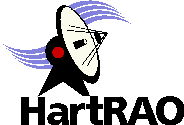Left click on image for large version. Credit: Michael Gaylard /
HartRAO
Detecting the radio emission from the Sun at 12 GHz using a satellite dish
with a radiometer attached to the Low Noise Block Converter (LNB).

HartRAO Home > news > NASSP radio astronomy practical 2012/09/03 - 2012/09/07
Aspects of their visit are shown in pictures below.
Left click on image for large version. Credit: Michael Gaylard /
HartRAO
Detecting the radio emission from the Sun at 12 GHz using a satellite dish
with a radiometer attached to the Low Noise Block Converter (LNB).
Left click on image for large version. Credit: Michael Gaylard /
HartRAO
Using eccosorb as a "hot load" to calibrate a 4 GHz satellite dish equipped with a radiometer so as to operate as
a radio telescope.
Left click on image for large version. Credit: Michael Gaylard /
HartRAO
Aiming a hand-held radio telescope at the Sun. Alet de Witt, a previous NASSP student and now
post-doc at HartRAO, watches (centre).
Left click on image for large version. Credit: Michael Gaylard /
HartRAO
Aiming the 4 GHz telescope at "cold sky". Astronomer Marion West, at centre
with back to the camera, provides assistance.
Left click on image for large version. Credit: Michael Gaylard /
HartRAO
Another team aims at the Sun.
Left click on image for large version. Credit: Michael Gaylard /
HartRAO
Where IS "cold sky"?
Left click on image for large version. Credit: Michael Gaylard /
HartRAO
What is the reading on the "hot load"?
Left click on image for large version. Credit: Michael Gaylard /
HartRAO
Measuring the angular diameter of the Sun. At centre Jabulani Maswanganye, a previous
NSSSP student now starting his PhD, provides guidance.
Left click on image for large version. Credit: Michael Gaylard /
HartRAO
The third group locating the Sun.
Left click on image for large version. Credit: Michael Gaylard /
HartRAO
Nearly on the Sun...
Left click on image for large version. Credit: Michael Gaylard /
HartRAO
The manually shifted 4 GHz telescope needs teamwork to aim it correctly.
Left click on image for large version. Credit: Sarah Buchner /
HartRAO
The students in the classroom at work on pulsar data from the 26m telescope,
learning to use tempo2 to analyse pulsar arrival times, with guidance from
astronomer Sarah Buchner and SKA post-doc at the University of the
Witwatersrand Neil Young.
Left click on image for large version. Credit: Sarah Buchner /
HartRAO
There was time for relaxation too, over a traditional "braai" (barbeque).
Left click on image for large version. Credit: Sarah Buchner /
HartRAO
More relaxation...
Left click on image for large version. Credit: Sarah Buchner /
HartRAO
On the last day of the practical the students climbed the 26m radio
telescope, led by Pieter Stronkhorst, Sarah Buchner and Alet de Witt.
Left click on image for large version. Credit: Michael Gaylard /
HartRAO
The students on the Declination drive platform.
Left click on image for large version. Credit: Michael Gaylard /
HartRAO
A closer view of the Dec platform.
Left click on image for large version. Credit: Sarah Buchner /
HartRAO
You want us to go WHERE?
Left click on image for large version. Credit: Sarah Buchner /
HartRAO
On the main surface of the 26m telescope.
Left click on image for large version. Credit: Sarah Buchner /
HartRAO
Group photo on the main surface of the 26m telescope.
Left click on image for large version. Credit: Sarah Buchner /
HartRAO
Group photo with some changes of cast
Left click on image for large version. Credit: Sarah Buchner /
HartRAO
The first students back on the ground, taken from the declination platform
of the 26m telescope.
Left click on image for large version. Credit: Sunelle Otto /
HartRAO / SKA-SA
The NASSP student group and some of the HartRAO research staff and students who took the
practical.
Left click on image for large version. Credit: Sunelle Otto /
HartRAO / SKA-SA
Student and staff group photo.